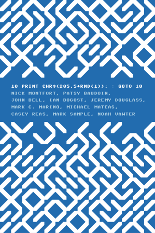I was at a workshop in Bergen on Tuesday and a conference in Edinburgh Thursday through Saturday. There were many interesting things to report or at least mention, and I’ve only managed to note two of them on the blog so far. I’ll also mention that in Bergen, I did the first transverse reading of the full ppg256 series, reading through the seven generators’ output four times. I was very pleased with the art gallery setting, the other readings and screenings, and the way my reading went.
Fortunately there is good documentation of both events in the ELMCIP Knowledge Base, a resource that lists critical work, events, and presentations about electronic literature as well as works of e-lit themselves. For these two events, abstracts and (in the case of the “Remediating the Social” ELMCIP conference in Edinburgh) full papers are included in the Knowledge Base as well.
For instance, my presentation in Bergen, represented by an abstract in the Knowledge Base, was “The ELO and Two E-Lit Exhibits.”
And, my keynote address at the beginning of the ELMCIP conference in Edinburgh was “Programming for Fun, Together,” for which a corresponding paper is available. I covered the main topics of the paper in about the first half of the talk and spent the second half trying to explain how to program in Commodore 64 BASIC, using concrete-poem-generating programs (including 10 PRINT CHR$(205.5+RND(1)); : GOTO 10) as my examples. I began by developing a program that prints “H” or “I” at random, using bpNichol’ favorite letter (“H”) and an adjacent letter that can be seen as either a rotation of “H” or a component of it. A one-line program was developed to printing either one uniformly at random. In part, this was my response to the less interesting but certainly more conventional “HELLO WORLD” program. I continued to show how a program that printed “x” or “y” could be quickly developed by modifying this one, after using Commodore BASIC itself, via the ASC function, to determine the appropriate new ASCII code. Then, I converted that program to “our” 10 PRINT (that is, the program I and nine co-authors have written a book about) and showed how the distribution and pair of characters could be changed.
In presenting these various 10 PRINT programs and developing new ones through modification, I wanted to show that BASIC programming can truly be undertaken in an exploratory way without a great deal of background. I also wanted to share with the group some of the amazing facility for poetic experimentation that is provided by a 30-year-old computer, inexpensive even at the time, that allows you to program immediately after being turned on.
Jill Walker Rettberg liveblogged my keynote (bringing back another wonderful historical tradition in digital media!) and there was also some discussion of the talk on Twitter.
My only regret related to the talk was that Rita Raley, who was scheduled to be the respondent for my talk, was unable to make it to the conference due to the storm damage and flooding in New York City. Scott Rettberg filled in and made a worthwhile connection from collaborative, social programming activity to collaborative writing, also questioning my four points about programming socially for fun.
The Edinburgh conference, which featured an exhibit at the Inspace gallery and performances throughout, resulted in a book that includes not only academic papers but also “artist’s pages” documenting the artistic works. I hope you’ll be interested in taking a look at the good supply of online “Remediating the Social” material.









